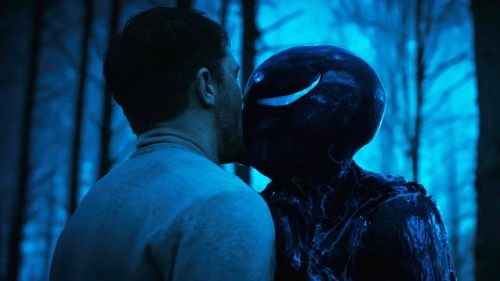Queer Underworld: SWISS ARMY MAN (2016)
It’s a common adage that, in fiction, the monster is never just a monster. Horror, science fiction, and fantasy are the venues through which we explore ideas through metaphor and allegory, sometimes unintentionally through the lens of an audience who connects with a work’s themes in a manner specific to them. Such is the case with all manner of LGBTQ cinema, which has often relied on metaphor to smuggle queer themes into cinemas or been subject to queer interpretations after the fact. We at Birth.Movies.Death want to give those queer readings of genre films a voice. This is Queer Underworld.
Swiss Army Man is such a strange, weird little movie. Obviously, any film about a man and his best friend the talking, farting corpse is going to be extremely idiosyncratic, but Daniel Scheinert and Daniel Kwan wrote and directed a film that is so attuned to a specific comic and empathetic wavelength that festival audiences infamously walked out within minutes of it starting. But underneath the eccentricity is a story about love: loving oneself, learning to reach out to another, and realizing how to present an authentic self in a world that rejects nonconformity. And yes, I think that’s queer as hell.
As the corpse of Manny (Daniel Radcliffe) gradually comes to life and becomes aware, it’s unclear whether he is a delusion brought on by Hank’s (Paul Dano) loneliness, a representation of Hank’s psyche via magical realism, an honest-to-goodness reanimated dead guy, or some combination of the three. Manny is clueless about the world and his life prior to death, so it falls to Hank to teach Manny about people, culture, and the extreme functions of his own body. There’s something childlike to Manny’s wonderment at the world he has just become conscious of, yet something completely pubescent in how Manny is at once amazed by his body’s abilities while Hank is disturbed and mortified. Initially, Manny is accepted for his novelty and his utility, but as we come to learn more about Hank and his affection for the mysterious woman who serves as his phone’s home screen (Mary Elizabeth Winstead), there’s more than just a little bit of projection in how Hank is ashamed of Manny’s farts and innocent ponderings.
It’s this sense of shame that exemplifies Hank’s arc through the film, as he comes to accept the normalcy of longing, the banality of human excretions, and the arbitrary boundaries we create for ourselves in seeking out affection. These are universal feelings, particularly among those young enough to be inexperienced in matters of love and sex, but what’s particularly interesting – and particularly queer – is how Hank goes about exploring his ability to love.
He roleplays. When Hank and Manny become trapped in a ravine, Hank explores his feelings for the mysterious woman on the bus by embodying the persona of that woman. He dresses as a woman, affects exaggerated femininity that gradually tempers into an alternate persona of its own, and allows himself to be wooed by Manny, who is, in turn, roleplaying as Hank. The film does not indicate that Hank is transgender, but what it implicitly does is acknowledge the utility of experimenting with gender expression in empathizing and coming to understand oneself. At first, femininity is meant to be a teaching tool to help Manny understand women, but it eventually helps Hank to understand his own sense of longing and to process his own inability to connect with others. Hank starts off by feeling ashamed for presenting in his makeshift wig and dress, but soon he’s asking if Manny finds him pretty and the duo start partying nightly in a facsimile of a dating relationship.
The film also draws attention to how this experimentation with gender expression immediately muddies the waters on the implicit straightness of a man-woman relationship. Within the fiction that Hank and Manny create, Manny takes on a male role while Hank takes on a female role, but if we accept Manny as at least partially a manifestation of Hank’s anxieties, then Hank holds both the masculine and feminine within him, since Manny is himself at least partly fictional, or at least not psychologically distinct. But embracing a feminine persona allows Hank to become romantically drawn to a masculine persona, and even if that masculine persona is just a reflection of his own relationship with maleness, that tells us two things. First, Hank is capable of attraction to men, regardless of his own gender identity. But second, and more importantly, he’s capable of loving himself, of seeing why he is potentially attractive to others. That was only possible through gender experimentation, by looking within himself to explore the complex dimensions of his personality, by no longer feeling constrained by social norms of what our bodies should do or should look like.
Now obviously this doesn’t lead to Hank getting the actual girl in the end, because that would reward his stalking behavior and the Daniels have a good enough sense of propriety not to do that. But that’s not ultimately the point of Hank’s story. As Manny jet skis out to sea on the power of his own farts, Hank is left with the realization that he no longer has to hold in his farts. People will either accept you as you are, or they won’t, but that doesn’t mean you can't love yourself or are hopelessly lost without the love of another person. Whether Manny was real or not is inconsequential to the result of Hank’s thought experiment in the woods, where, by teaching Manny how to literally live, he came to embrace life himself. And the key to this, the lynchpin in understanding his capacity to love himself and others, was through experimenting with his own sense of gender and physical attraction.



